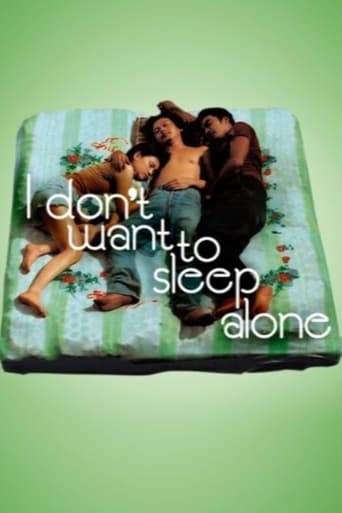

Load of rubbish!!
... View MoreA very feeble attempt at affirmatie action
... View MoreAll of these films share one commonality, that being a kind of emotional center that humanizes a cast of monsters.
... View MoreThe movie is wonderful and true, an act of love in all its contradictions and complexity
... View MoreLet me start off by saying I am a Tsai Ming-Liang fan, having seen just about all of his films. He is a master of the long shot, as well as telling a story with minimal dialogue. This story is about a street person (Tsai's muse Lee Kang-Sheng), who gets beaten up by a gang. He gets rescued by Bangaladeshi immigrants, who take him back to where they live (it is not a home, more like a construction site). They nurse him back to health. His character (the characters are not named, an interesting way of telling the story) meets and also spends time with a waitress (Chen Shang-Chyi, a pretty veteran of Liang films). This causes jealousy, both with the immigrant who saved him and the mother of the waitress. The mother and daughter also care for an invalid, bed ridden brother, who is also played by Lee Kang-Sheng. This story, set in Tsai's home country of Malaysia, is indeed oddly touching, an exploration of loneliness, the need for human contact, jealousy and survival. This is not for everyone, certainly not lovers of action and fast moving films. All of Tsai's films are slow and methodical, and this one has a heart. He is fairly unique in his storytelling, I like that emotions can be conveyed with so little said. I always liked the combination of Keng-Shang and Shang-Chyi as a couple in his films, they seem very comfortable with each other. That being said, check out these Tsai films first for a primer into his style: "The River", "What Time Is It There" and "The Hole". I liked this, the film has heart.
... View MoreThis is a strange film, very strange, and not the type of film to get a release outside of a festival. There was virtually no dialogue for two hours - mostly visuals with background noises and music (played in the scene, not dubbed over). We see various strugglers in the streets and buildings of Malaysia and get a strong sense of alienation.The film is almost a photo essay, constructed largely of beautifully composed shots of urban decay. There's the flooded building site, modest abodes, a huge butterfly and the surreal-looking streets choked in smoke from Indonesian bushfires. The film challenges an audience's patience and I was surprised there were only a few walkouts at the Melbourne International Film Festival I attended. My partner left after 90 minutes, and shortly after a little more action started to appear.A sex scene interrupted by the smoke was amusing. The final take is particularly poignant and poetic. The film is not something I would generally recommend to mainstream audiences, but if you like something unusual during a festival, it might be worth a look in. Just be prepared to be patient.
... View MoreWhen I left the theater two nights ago after seeing I Don't Want To Sleep Alone, a woman exiting with a friend in front of me turned to her companion and said "I'm so sorry, I thought it would be good"....but to me it was good, if not excellent. This movie is really such a great example of how film can define one's aesthetics. You like slow movies or you don't. You like people wearing plastic trash bags over their mouths while attempting love-making or you don't. You like subtle expressions of desire or you don't. Tsai's films let you do the exploration, instead of having a tour-guide with a megaphone pointing out the most important highlights of the experience.Funny, a few years ago when I saw Lost In Translation a similar thing happened. A young couple leaving the theater talked about how nothing happened in that movie and how boring it was. At precisely the same time I was thinking how moving the film had been to me.See the film--you might find it boring but I would be surprised if you don't think about it a lot more after viewing it than almost any Hollywood blockbuster.
... View MoreDirector Tsai Ming-Liang sets this film in his native Kuala Lumpur. Hsaio-Kang (Kang-sheng Lee) is beaten up by street hustlers and is carried back to a abandoned half-completed building, home to the homeless and downtrodden, by a group of Bangladeshi men. There he is meticulously, even lovingly, brought back to health by Rawang (Norman Bin Atun), where they share a salvaged, stained flea-ridden mattress.Once his strength comes back, Hsaio-Kang ventures out and meets waitress Chyi (Shiang-chyi Chen) and her older boss (Pearlly Chua). Chyi is made to care for a bed-ridden paralyzed man.One of the interesting aspects of this film is the depiction of a poor district of Kuala Lumpur: multilingual (Malay, Bangladeshi, Mandarin), hopelessly derelict, dirty, and run-down. The characters silently struggle to survive day-to-day, and strive to make human connections with one another amid their squalor.The central abandoned half-finished concrete office building, with its exposed rebar and flooded basement, is a perfect set.A haze descends on the city, a result of fires in far-off Indonesia, which sets the stage for a tragi-comic attempt between Chyi and Hsaio-Kang to make love while wearing improvised surgical masks and through hacking coughs.This minimalist film moves very slowly, lingering on each shot for sometimes one or two minutes. Simple acts such as washing a paralyzed man's face, or a cigarette enjoyed next to the flooded basement's pool, become almost hypnotic.All that said, when I walked out of the theatre, I was sure I did not like this film, due to the slow pace and almost total lack of spoken dialog. But the next day I found myself thinking of the film all day long, its characters and silent relationships. Maybe in that sense, this film accomplished its goal.
... View More